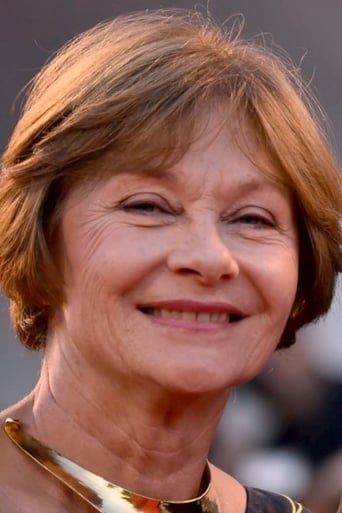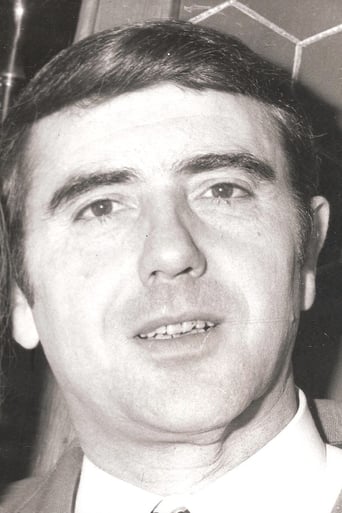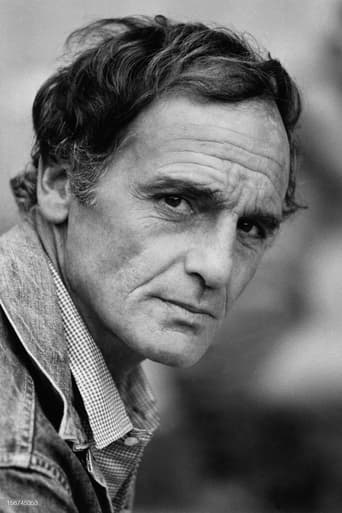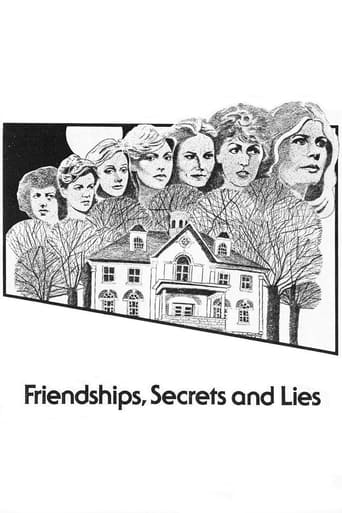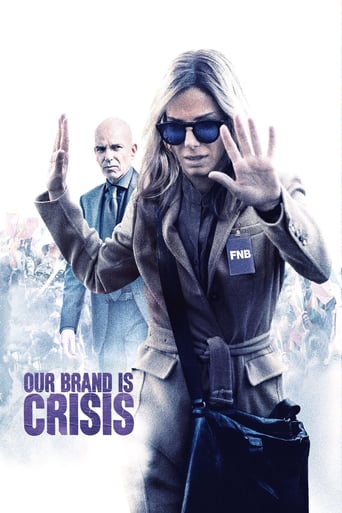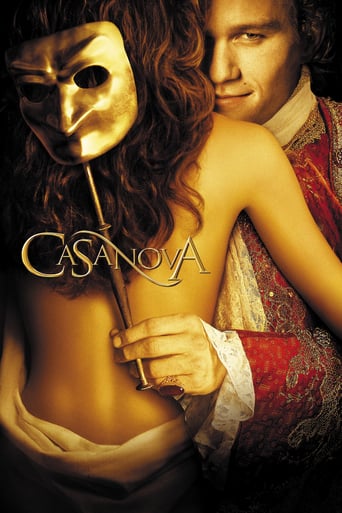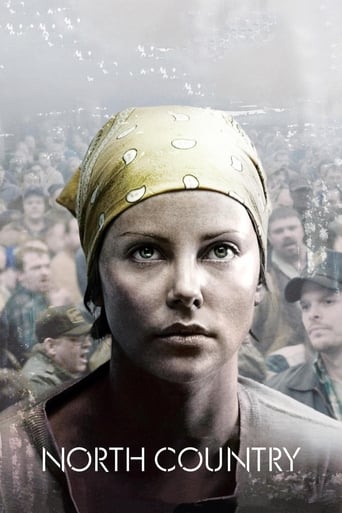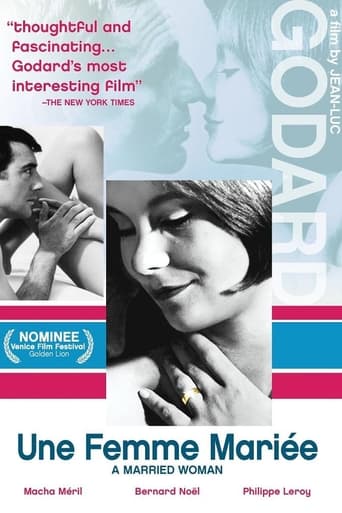
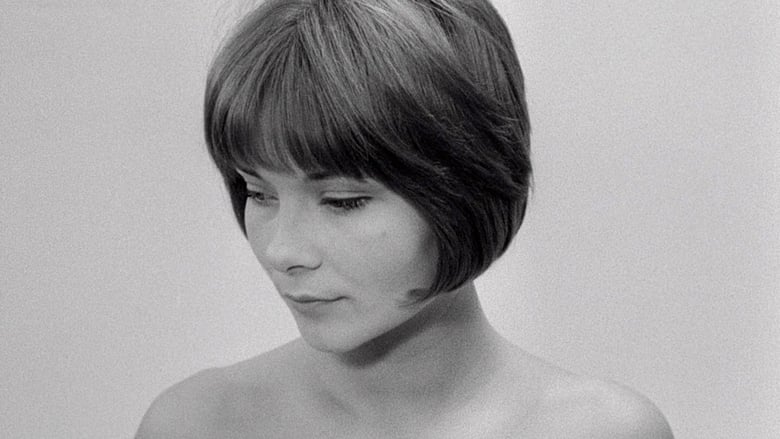
The Married Woman (1965)
A superifical woman finds conflict choosing between her abusive husband and her vain lover.
Watch Trailer
Cast
Similar titles
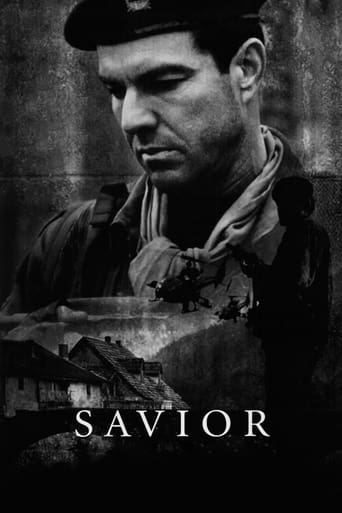
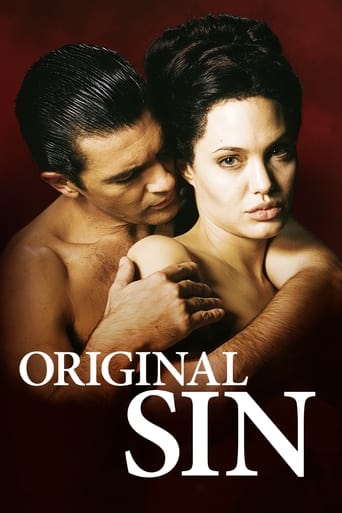
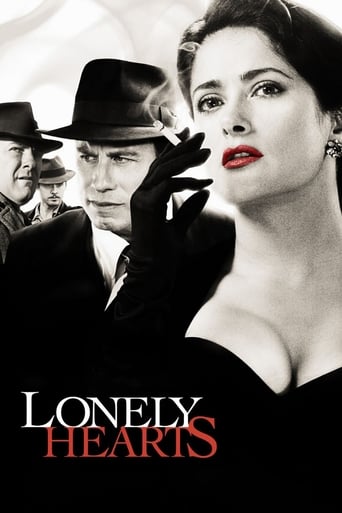

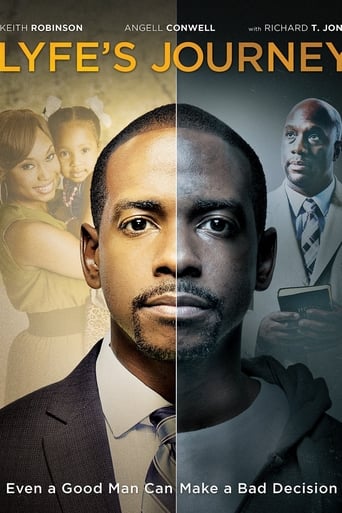
Reviews
Don't Believe the Hype
Strong acting helps the film overcome an uncertain premise and create characters that hold our attention absolutely.
While it doesn't offer any answers, it both thrills and makes you think.
The acting in this movie is really good.
Charlotte is young and modern, not a hair out of place, superficial, cool; she reads fashion magazines - does she have the perfect bust? She lives in a Paris suburb with her son and her husband Pierre, a pilot.Whilst in Cannes in May 1964 Godard met Luigi Chiarini, the director of the 1964 Venice Film Festival, and offered to make a film that would be completed in three months in time to premiere at Venice - the festival would run from August 27 to September 10. The film would be the story of a woman, her husband, and her lover, and the woman would find out that she is pregnant and not know whose child it is.I find it hard to believe that Godard is still alive today (2016), because his films seem so much a part of the past. How can anyone still alive have been so influential to everyone in the 70s, 80s, 90s and so on? But he is. And this is one of those films, because it is just beautiful. There is plot, but the real focus is on art. It is like pop art caught on film, beautifully so.
Jean-Luc Godard's eighth feature film, UNE FEMME MARIÉE (A Married Woman, 1964) is a tale of adultery. As it opens, we meet Charlotte (Macha Meril) at a tryst with her lover Robert (Bernard Noël). Though Robert tries to convince her to divorce her husband, the pilot Pierre (Philippe Leroy), Charlotte's loyalties remain divided.Godard labeled UNE FEMME MARIÉE not a "film" but rather "a collection of fragments from a film shot in 1964". However, this is much less avant-garde disjointed than one might expect. Godard chooses a fragment-based means of storytelling for the moments between Charlotte and her lover, presenting a sequence of brief dialogues between the lovers in rapid succession. Each of these self-encapsulated moments serves as another brick in the wall of what we know about the relationship. Such compressed storytelling manages to distill otherwise ineffable interpersonal dramas and feelings. The framing in the scenes between Charlotte and her lover is remarkable: close-up shots of their faces or limbs against featureless backgrounds. Generally the face of the person speaking is not shown and we hear only the words.But while there had already been myriad such tales of love triangles through the ages, this film offers something fresh by combining it with a critique of 1960s consumer society. The characters pepper their conversation with commercial jingles, parrot whole advertising texts, or recite factoids. In shots of home life, the latest fancy name-brand cleaning products and electronics are placed prominently in the frame. Charlotte and her maid read women's magazines and see whether they live up to the standards of beauty that the media prescribes. The Auschwitz trials were going on at the same time as shooting, and Godard chose to work references to this into the characters' conversations. In this way, he underscores how consumer society emphasizes thinking about the present, buying whatever is called must-have now, and thus discourages self-reflection and critically gazing on the past. The film's message remains perennially fresh, and I think many viewers will enjoy UNE FEMME MARIEE.Godard would take up the "housewife and consumerism" theme again three years later in 2 OU 3 CHOSES QUE JE SAIS D'ELLE, where this time the housewife prostitutes herself during the day to buy all the nice things that her husband can't. As a critique of consumerism, that later film is more successful inasmuch as it was shot in colour, and thus shows how commercial brands were using brash designs to draw the eye of shoppers. ("If you can't afford LSD," Godard says in a voice-over there, "buy a colour television.") However, UNE FEMME MARIEE is not just a rough sketch for the later film, and I'd even call it a better film, inasmuch as it tells a coherent story while the elements of the later one don't entirely come together for me.
I was all set to adore this movie. I'd just seen Woman is a Woman and loved it, and the opening 30 mins of this look gorgeous in black and white on Blu Ray. The whispering and close-ups are hypnotic, and the monkeying around is not bothersome. But then, quel disastre, a typical Godard left turn, and I have to sit through (what felt like) 45 minutes of ponderous talking heads. You had to be there. I took years to get around to watching this, and I was loving it, honest, but man, he just wore me down. I had to admit that I was hating it. Just like some boring documentary. Why oh why such extended ruminations. Show not tell that's the idea. In this film its show for 30 minutes then tell for 30. I had to turn it off, sadly. So, my rating reflects this. I loved exactly half of what I saw. 5/10
We see a hand, then another hand, in the frame of the opening shot of Jean-Luc Godard's Une femme mariee. It's from here that we see a succession of images, all of the body but never anything explicit- a leg, a belly-button, hands, a back, a nude front but covered breasts. Godard is inquiring about the form of a body in and of itself while also trying to find new ways of photographing it. In these shots, which also happen again in this sort of physical poetry a couple of other times in the film, illustrate something both absorbing and elusive about the film in general. It's about form and 'lifestyle, of the married life and the affair, of a bad husband and a tricky squeeze on the side... but then we also have scenes that puncture through the infidelity drama: there's a scene where Robert, the lover, and Charlotte, the main femme of the movie, are sitting in a movie theater at an airport, discreetly, and one wonders what they're about to watch (just before this an image of Hitchcock appears as if Charlotte sees it in the lobby), and it turns out to be some kind of holocaust documentary ala Night & Fog. They leave right away. Too much of a shock, or too much reality? How does the outside world affect these people?We get a lot of scenes of characters just talking to one another, asking questions, sometimes in documentary form. Whether it's really Godard off camera asking the questions and turning it into a docu-narrative of some sort (the old Bazinian logic taken to an extreme that an actor in front of a camera is still in a documentary of the actor acting on camera perhaps), or the characters themselves is kept a little unclear. But this doesn't distract from the dialog and monologues being generally, genuinely intriguing and moving even. There's one scene in particular that I shall not forget easily, no pun intended, when Pierre, the husband, espouses about memory and how "impossible" it is for him to forget, and how rotten it can be for someone who has dealt with real horror (he recalls a story, as his character is a pilot, of talking to Roberto Rossellini about a concentration camp victim and memory and that it made him laugh - again, a very harsh contrast of Dachau and Auschwitz mentioned for interpretation). This and a few other times when characters just go off on something has a lasting impact. Une femme Mariee is filled with the sort of cinematic rhythm that would immediately say to someone unfamiliar with foreign/art-house film, let alone Godard, "oh, that's an 'arty' movie". It certainly is: everything from its themes of alienated characters to its lyrical and original cinematography to the repetition of the Beethoven music (later used in Prenom Carmen) to image itself becomes an issue like when Charlotte obsesses over ladies wearing bras in a magazine, it's all from an artist who expresses his concerns in a my-way-or-the- highway attitude to the audience. And you want to go along with him, if curious enough, to see where he'll take his trio of characters in the Parisian settings. Sometimes there's even weird, dark humor, like when Charlotte finds a random record of some woman in agony and it's the sound of a woman just laughing - something that Charlotte and Pierre listen to in silence until Charlotte wants to put on another record and she becomes like a little kid trying to put it on without Pierre getting in her way. What looks disjointed and without a plot is deceptive when looking at it in pieces. But somehow Godard's film works as a whole piece, and it's part of the point to find this character Charlotte not easy to figure out. The men in her life barely know themselves. And by the end, when it should be about the melodrama of a baby on the way, Godard side- steps this (already dealing with it comically in A Woman is a Woman), by making it about something else on the surface and underneath full of tension. Notice how demanding Charlotte is of answers from Robert about what it means to be an actor. He answers well and stands his ground, but it becomes noticeable that it's not about getting answers on acting or real love but about this woman's tortured self-made life. It's not emotionally gripping, but it gets one to think and it's this that makes Godard's film special in his cannon of great 1960's works.
